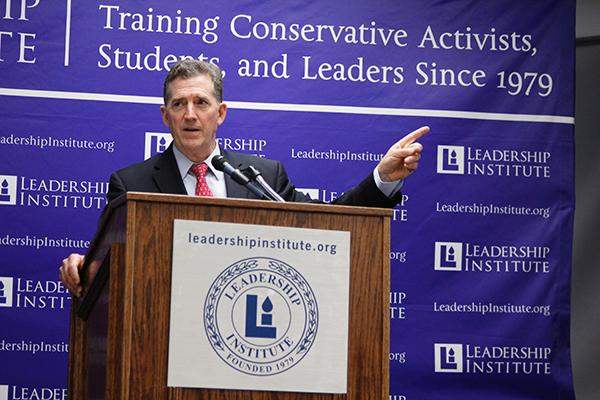
Ali Kudlick
June 6, 2014
Senator Jim DeMint’s Remarks at LI
Senator Jim DeMint, now president of The Heritage Foundation, joined the Leadership Institute and 234 guests earlier this week for LI's monthly Wednesday Wake-Up Club Breakfast. He encouraged attendees to bring conservative principles back to America through reasonable alternatives.Throughout his presentation, Hon. DeMint referred to a group of people he calls “the Movable Middle,” who “share our [conservative] ideas and are looking for a political home,” he said. These people question the status quo and are in search of alternatives.“We can help Americans see these [conservative] ideas in the context of their life, in the context of a great country and a better future,” he said.He stressed the importance of sharing conservative success stories on state and local levels and explain how it has impacted the American people. “We are trying to stop an avalanche,” he said. “All we have to do is get a lot of people to think we are a reasonable alternative, because people want an alternative.”Americans across the country are in search of solutions to the obstacles before us. “The answer to a lot of things,” according to him, “is for us not to make one-size-fits-all solutions from Washington. The best solutions come from the governments that are closest to the people they affect.”Hon. DeMint's message inspired hope and highlighted the importance of the tenth amendment and the evidence that state and local governments are the best entities to exercise the powers reserved to them. He concluded by urging fellow conservatives to continue growing the movement toward freedom. “What you do at the Leadership Institute – at the grassroots level, at the student level – is really planting the seeds for our success in the future,” Hon. DeMint said.As for the upcoming election cycle, he shared with the crowd what he tells his staff at The Heritage Foundation: “In 2014, our job is to stop the bleeding. In 2016, our job is to turn our country around.”While the American people today express more disapproval in the government than ever before, conservatives must be prepared and equipped to show that conservatism has worked, is working, and is the most reasonable alternative to the progressive policies that destroy our nation.Come to the Leadership Institute to learn how to be more effective in public policy. Register for a training by clicking here.For Jim DeMint's full remarks, click here>
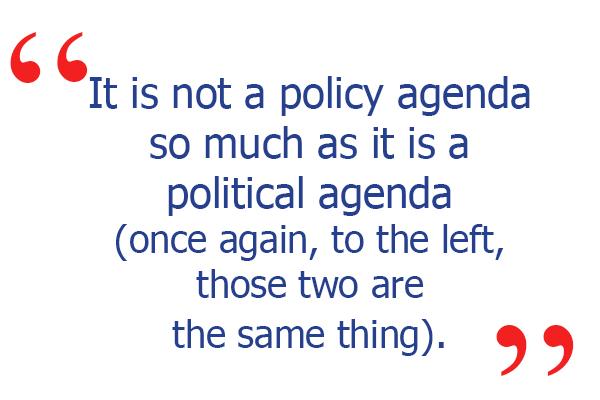
Steven Sutton
May 13, 2014
Sutton’s Place: Obama sounds midterm alarms for Democrats
Many graduates of LI political training have asked if the Institute provides follow up to the sessions on strategy and messaging. To provide for a way to continue your education in this important area, LI will provide a new feature and service --- an occasional commentary called "Sutton's Place," written by LI's Vice President of Development Steven Sutton, on current campaign messaging and strategy. Here's another Washington Post article (this one from March 12, 2014) which details the left's strategic plans for 2014:http://www.washingtonpost.com/politics/obama-warns-democrats-beware-another-midterm-election-defeat-like-2010/2014/03/11/88eb3348-a94a-11e3-8599-ce7295b6851c_story.htmlIt should come as no surprise to anyone exactly what the left will be doing this year, both politically and legislatively (which is the same thing to the left …remember, as far as the left is concerned, governing is simply politics by other means). The left understands that to have an impact on a large enough scale to matter, they need to announce their strategies far and wide. So if you keep your eyes and ears open (or continue to read these commentaries) you will know exactly what they are doing, when they are doing it, and why they are doing it.According to the Post article, “A White House official said Obama will do whatever he can to maximize turnout – working to get the Democratic base out.” With that as the backdrop for the president's actions this year, what do you think the chances are for the Keystone Pipeline, for example, to be approved this year? The merits of the project are irrelevant. There is simply zero chance that the president will risk upsetting his base by approving Keystone this year. Doing what is best for the country, economy, and for energy independence (especially if it goes against a core constituency in your political base) requires leadership. Yet for a president who always puts politics ahead of policy, this decision is a no-brainer. This president puts his political party's interests ahead of America's interests time and time again.More from the article: “White House officials say his (Obama's) most important role will be drawing clear contrasts between the parties on the minimum wage, college affordability, pay parity and other bread-and-butter Democratic issues.” One official was quoted as saying, “The president can set the terms of the electoral debate and lay out a unifying economic message for Democrats.”That is why you have seen (and will continue to see) votes in the Senate on the minimum wage, pay parity, “income inequality” and other issues designed exclusively and cynically to promote a political message. It is not a policy agenda so much as it is a political agenda (once again, to the left, those two are the same thing).Note the final paragraph of this article. Congressman Steve Israel, chairman of the Democratic Congressional Campaign Committee (DCCC) says, “If you're a Democrat who cares about our future, the stakes are high – whether it's raising the minimum wage or making sure that women earn equal pay for equal work…” Right on message (and repeated by a willing mainstream media reporter on page three of the Washington Post…gotta make sure everyone in the left's coalition knows what the message is, after all).If you want to stay most up-to-date on the left's 2014 messaging and political agenda, you may want to simply go to Congressman Steve Israel's website (or that of the DCCC). You can be sure that their message, and the issues they will use to advance that message, will be prominently displayed there.Prior to joining the Leadership Institute, Steven Sutton was a chief of staff in the House of Representatives for more than 14 years, where he specialized in setting up Congressional offices for four different incoming freshmen Members. He has also managed numerous political campaigns from city council to U.S. Congress, specializing in challenger campaigns. As a graduate of the United States Naval Academy, Steve has a Bachelor of Science degree in mechanical engineering with many interesting stories to boot!As a 501(c)3 nonprofit organization, the Leadership Institute does not oppose or endorse any faculty opinions such as Steve's thoughts above, or any legislation, candidate, or elected official. LI offers more than 41 types of training programs, works with more than 1,589 conservative campus groups on colleges across the country, and helps employers connect with conservative jobseekers. Since the Institute's 1979 founding, more than 146,000 conservative activists, students, and leaders have been trained. Graduates include members of Congress, state legislators, local officials, media personalities, and conservative organization leaders. For more information, please visit: www.LeadershipInstitute.org>
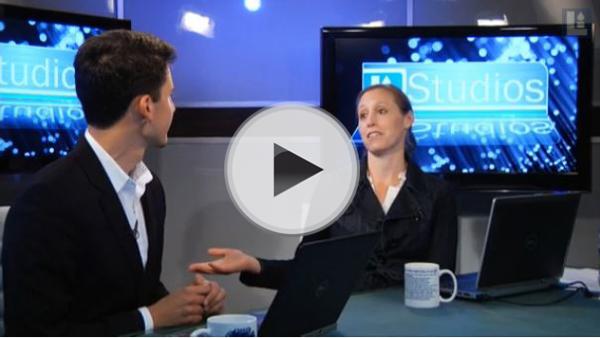
Carol Wehe
May 8, 2014
Breaking Records & Boundaries to Take LI Training to Your Living Room
The Leadership Institute broke the all-time webinar training record for live attendees during the April 25 webinar Growing Your Digital Reach featuring lecturer Ericka Andersen, The Heritage Foundation's digital media manager. One hundred eighty-one conservatives watched this live lecture online to learn how The Heritage Foundation connects with so many people, and how other conservative groups can grow their digital reach through email lists, multiple social media platforms, friends, allies, and giving back online.Click the picture to the left to hear The Heritage Foundation's Digital Media Manager Ericka Andersen speak about growing your digital reach.Twitter Abuzz About #LIwebinarSome attendees took to Twitter to live tweet Ericka's lecture. The Franklin Center of Government & Public Integrity's Outreach Manager Chris McCoy (@ChrisYMcCoy) tweeted one point she learned, “DON'T automate! Don't hook the same exact messaging to FB Twitter Instagram etc #LiWebinar Be Real.”America's Future Foundation (@AFF) told their followers to watch: “Happy Friday! Want to learn the secrets of growing your digital reach? Join @LeadershipInst today for a free webinar!"Karin Davenport also thanked LI saying, “Thx for the @LeadershipInst webinar today! As Comm Dir. of @USEnglishInc, it gave us lots of great new ideas!”Tweeted from behind the scenes in the control room at LI Studios, this picture to the right shows Ericka Andersen wrapping up her popular lecture on growing your digital reach, and Paulo Sibaja reading through the many attendee questions on twitter and email.Video LibrarySince 2011, the Leadership Institute has trained 3,450 attendees through free live webinars online, taking training to conservatives everywhere, from their living rooms to their offices, and with their local campaigns and tea party groups. After airing live, LI archives webinars and makes them available through the Leadership Institute's Online Video Library. Click below to see the archive of LI's recorded webinars.Watch the Leadership Institute's archive of recorded webinar trainings in any of these categories – Activism, Campaign, Campus, Career, Communications, Fundraising, and New Media. These webinars are free thanks to LI's generous donors and faculty, who give their money and time to make LI training possible. Generous Leadership Institute donors make webinars available at no cost to activists because they believe in training the next generation of conservative leaders. LI's speakers, experts in their respective fields, generously volunteer their time and expertise because they, like the Institute, want to increase the number and effectiveness of conservative activists in the public policy process. As LI President Morton Blackwell says, “Political technology determines political success.” >
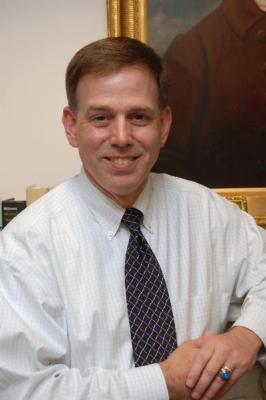
Steven Sutton
May 1, 2014
SUTTON'S PLACE: A place for current trends in campaign messaging and strategy
Many graduates of Leadership Institute (LI) political training have asked if LI provides any follow up to the sessions on strategy and messaging. To provide for a way to continue your education in this important area, LI will provide a new feature and service --- an occasional commentary called "Sutton's Place," written by LI's Vice President of Development Steven Sutton, on current campaign messaging and strategy.Welcome to Sutton's Place...a small slice of campaign strategy and messaging heaven. The purpose of Sutton's Place is to continue the education you received at a Leadership Institute training school. Hope you find it interesting, educational, and complimentary to your LI training.We start off the first of these commentaries with an article which appeared recently in the Washington Post entitled, House Democrats plot strategy against long odds to win back chamber.Click here for the full Washington Post article.This article reports on an "annual retreat at a resort on Maryland's Eastern Shore." Both major political parties have these annual retreats, but the Democrats appear to actually discuss strategy and messaging in a disciplined way that results in attempts by their leaders and rank and file members to coordinate and implement a strategic message that they articulate to voters. As the article reports, House Democrats developed and refined the following theme for the 2014 elections: As stated by Congressman Steve Israel, chairman of the Democratic Congressional Campaign Committee...the DCCC, the Dems will champion "building an economy that works for everyone and not just special interests."Other Dem Members state: "The majority is supposed to...move us forward..." There's that word again..."forward.""If Republicans shirk their responsibility...we're ready to lead.""Dem unity will give voters a clear choice...More obstruction...or get something done."You can see the beginning of a clear theme, but there are some big problems with it.It will be very difficult for Dems to make the case that they will "lead" when their political leader (President Obama) has shown himself to be the weakest leader/President since Jimmy Carter (now there's an interesting way for the GOP to message back on this).Another problem is that the very high "wrong track" polling numbers suggest that Americans don't want to be led in the direction suggested by the left. And another problem is that this message is unlikely to sufficiently motivate the left's base to come out to vote this year, and that is the challenge and goal for the left. Negatives (such as fear) are more powerful motivators. The above themes are simply not strong enough to motivate their base. That suggests (once they realize this) that things will get much more confrontational/negative as Election Day nears. This retreat was held earlier this year (in February). I sense a shift in the left's strategy since then (more on that in a future Sutton's Place article).Prior to joining the Leadership Institute, Steven Sutton was a chief of staff in the House of Representatives for more than 14 years, where he specialized in setting up Congressional offices for four different incoming freshmen Members. He has also managed numerous political campaigns from city council to U.S. Congress, specializing in challenger campaigns. As a graduate of the United States Naval Academy, Steve has a Bachelor of Science degree in mechanical engineering with many interesting stories to boot!As a 501(c)3 nonprofit organization, the Leadership Institute does not oppose or endorse any faculty opinions such as Steve's thoughts above, or any legislation, candidate, or elected official. LI offers more than 41 types of training programs, works with more than 1,589 conservative campus groups on colleges across the country, and helps employers connect with conservative jobseekers. Since the Institute's 1979 founding, more than 146,000 conservative activists, students, and leaders have been trained. Graduates include members of Congress, state legislators, local officials, media personalities, and conservative organization leaders. For more information, please visit: www.LeadershipInstitute.org>
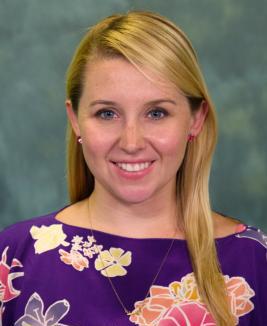
Lauren Day
April 17, 2014
Since January, 100's of Jobseekers Benefit from LI's Career Services
In Tuesday's all-staff meeting, Leadership Institute President Morton Blackwell announced LI's Employee of the Quarter award recipient."Aynsley Harrison has helped LI assist hundreds of conservative job seekers this year alone," LI President Morton Blackwell said."She put together a job fair at the Conservative Political Action Conference (CPAC) that served more than 400 job seekers with more recruiters and job openings than previous years," he continued.Aynsley is the Career Services Department coordinator and started at the Institute last August."Aynsley spear-headed the one-on-one career counseling center at CPAC, which allowed 39 job seekers to have 30 minute meetings with Leadership Institute staff to edit their resumes and develop plans of action to help them get their next job," Morton said."Finally, she has made LI's resume consultation program a must-stop shop for job seekers, with more than 100 people seeking guidance from LI in just three months – a number that took almost a full year to attain in 2013," he concluded.Great work, Aynsley! >
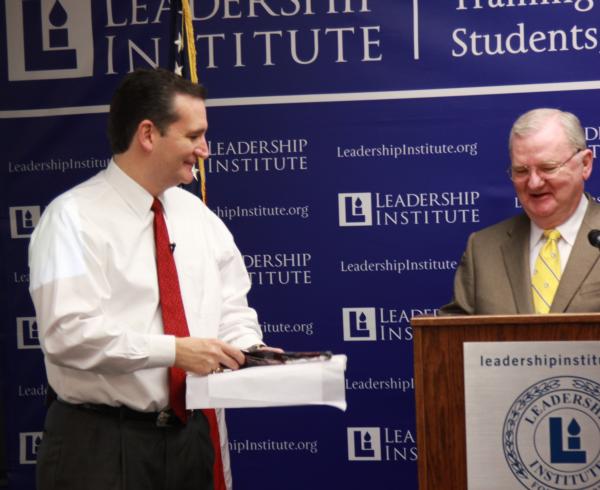
Jessica Yu
February 10, 2014
Ted Cruz's Visit to LI
Senator Ted Cruz (R—TX) came to the Leadership Institute's Wednesday Wake-Up Club Breakfast last week and spoke to 229 conservatives about the current state of affairs.Activists, supporters, and LI graduates braved the harsh weather for the largest Leadership Institute (LI) breakfast turnout since the program began in 1997.Senator Cruz began by quoting Sam Houston, “Texas has yet to learn submission to any form of oppression come from what source it may… that is an attitude the Leadership Institute has embraced for a long, long time.”To read more about the role the Leadership Institute played in Sen. Cruz's campaign, please go here for info regarding his field staff and here for info on his pollster. Sen. Cruz spoke to the power and importance the grassroots movement plays in maintaining and advancing the conservative movement.“Right now, today, Obamacare is at its lowest approval rating it's ever been since the day it passed into law,” he said.The people will rise up against restriction upon their freedoms, he said. And it is this, he believes, that drives the grassroots movement to act and be so effective.“If you have a President who picks and chooses which laws to follow and which to ignore – you no longer have a president,” Sen. Cruz said.The website www.makedclisten.org is an initiative he urged attendees to visit and then Tweet about.Senator Ted Cruz said, “If we continue doing what we're doing which is mobilizing and empowering the American people – it's not going to come from Washington – it is what the Leadership Institute is doing every day.”"Liberty is never safer than when politicians are terrified,” Sen. Cruz closed.Please join LI at the next Wake-Up Club Breakfast on March 5. The speaker will be Rep. Steve Scalise, chairman of the Republican Study Committee. Sign up here.>
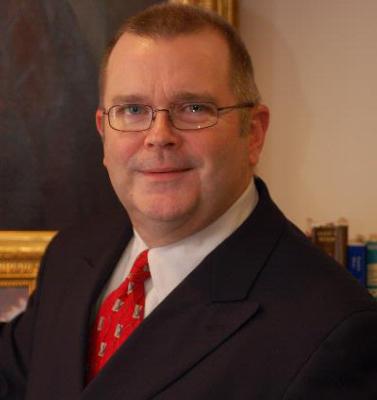
Lauren Day
January 29, 2014
LI's 2013 Employee of the Year
"Our 2013 Employee of the Year is Christopher Doss," Leadership Institute President Morton Blackwell said in yesterday's all-staff meeting."Chris personally organized 46 trainings in 2013. Working almost every weekend, Chris trained 2,268 of the 10,062 total students LI trained domestically," Morton continued."Put another way, Chris was responsible for more than 22 percent of all of LI's domestic training in 2013," Morton said."Chris has worked diligently to establish strong relationships with dozens of organizations," Morton said. "Chris is a team player who is always willing to help other departments," Morton said. "Whether it is lecturing for another department or taking an intern to lunch to discuss conservative philosophy, Chris is willing to go above and beyond the scope of his job."Congratulations Chris!>
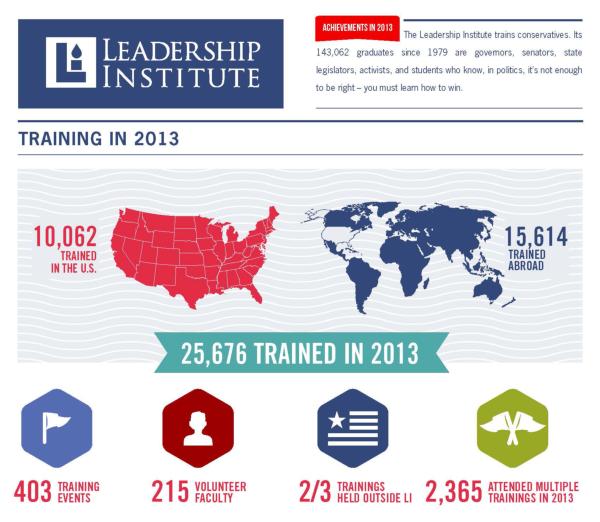
Lauren Day
January 14, 2014
LI’s 2013 in Review
This past year—2013—was record-breaking for the Leadership Institute!LI's staff and 215 volunteer faculty trained 10,062 students nationally and 15,614 students internationally—the most ever in any year of the Institute's 34-year history—bringing the total trained to 143,062 since its 1979 founding. LI hosted 403 trainings in 42 states and 14 countries.In 2013, these 403 trainings covered 37 types of LI trainings as varied as On-Camera TV trainings, week-long Campaign Management Schools and Comprehensive Fundraising Trainings, Grassroots Activism Workshops, Issues That Unite: Latinos & Conservatism workshops, Public Relations Schools, and Career Trainings.Many of the 521 articles that LI's CampusReform.org published made national news, making the site America's #1 source for campus news online with 3,762,485 unique visitors.LI's national field program employed 15 fall field representatives who helped conservative students bring 304 new, independent student groups into LI's unique network of 1,485 student groups on 618 college campuses—the largest such network in the country. LI's 6,999 job seekers had 1,672 available jobs posted to peruse on LI's ConservativeJobs.com website. LI's Career Services Center hosted 1,043 attendees at job fairs and offered 103 hours of personal career mentoring for free.LI's free live webinars featured 32 speakers in 2013 with a total of 1,609 students who watched and participated through the live chat features.LI's Wednesday Wakeup Club Breakfasts hosted 1,226 attendees and 10 speakers in 2013. In October, LI hosted the most widely attended breakfast since the program began in 1997; there were 209 guests who heard from Senator Mike Lee. LI's 42nd National Fourth of July Conservative Soiree hosted 977 attendees and a record-breaking number of 26 partnering organizations.LI's 33 interns came from 25 colleges, 17 states, 5 countries, and spent 6,103 hours combined in LI training.It's been a good year at the Leadership Institute, and we are excited about what 2014 has in store!How has LI helped you? Email Lauren@LeadershipInstitute.org to share your story. We are always looking to spotlight faculty doing incredible things for the conservative movement, notable LI graduates making waves, and college students standing for liberty.>

Kyle Baccei
October 4, 2013
Final 5 lessons from this week's fundraising training
The week-long Comprehensive Fundraising Training -- a bootcamp on raising more funds for causes and campaigns -- finished yesterday with the second day of the Direct Mail School. You can find previous highlights from the first day, second day, and third day of the fundraising trainings this week.-----Don't use the plural. Write to one person.Rick Hendrix, Founding Partner of ClearWord Communications Group, came back to lead the final day of the Direct Mail School and Comprehensive Fundraising Training. He taught attendees how to write effective fundraising letters to their donors.Other key points:--> Know your target audience. What are their backgrounds and what are their issues? Ask yourself, who are you writing to? What are you writing about?--> The first line must grab the reader's attention. You need a strong opening.--> In the closing, restate what you want the donor to do. Ask for the gift!-----Direct mail is like a contract. You make an offer and the donor accepts it. Treat the donation like an investmnet.Robert Stuber, Director of Development at Americans for Prosperity, joined the attendees of the Direct Mail school to explain how to make an offer a donor can't refuse.Other key points:--> Donors want value -- and credibility.--> You want to have a life-long relationship with your donor. The goal: a donor giving you $15 should have such a lasting love of your organization that he or she includes it in their estate plans.--> List specifics -- about your organization and your projects -- to give you credibility. List the technical specifics to show what you will use donors' money to do.--> Be timely in your talking points. If you're not, it seems like you don't know what's going on.-----Remember that your donors are on a calendar-year schedule.Matt Waters, President of Waters Agency, was up next. He talked to attendees about how to get a fundraising letter opened, by personalizing the piece and using the calendar.Other key points:--> You want your piece to be high-quality, but you don't want to make it seem like you're investing too much money in it.--> To personalize your pieces, use multiple stamps, handwritten font, and a return address. Write in the letter.-----Be an archer. Every interaction with a donor is getting you closer to the bull's eye.Brian David of Active Engagement spoke next. He presented on the importance of online efforts to complement a direct mail fundraising program.Other key points:--> Be consistent across multiple channels (e.g. mail and email), especially with your logo.--> Know your medium. Online is great for things happening right now. Traditional mail is great for perennial issues.--> The fundamentals of online fundraising are no different than those of direct mail.-----Read My Life in Advertising and Scientific Advertising (on Amazon here).Richard Viguerie, Chairman of American Target Advertising, Inc., closed out the Direct Mail School and the week-long Comprehensive Fundraising Training. Often referred to as the "funding father" of the conservative movement, he shared his valuable personal and professional experience with attendees.--> A donor base is critical to your direct mail efforts.--> Understand the lifetime value of a donor. This is the key to good fundraising.Kyle Baccei is the Communications Manager for the Leadership Institute. Follow him on Twitter (@KyleBaccei).>

Kyle Baccei
October 3, 2013
5 tips for raising money by direct mail
The first day of the Direct Mail School was a busy one for attendees yesterday. The training is the second half of the Leadership Institute's Comprehensive Fundraising Training -- a week-long bootcamp on raising funds.Below are the big lessons I got from each speaker. The last round of updates will be here tomorrow.-----The right lists won't guarantee success, but the wrong list guarantees failure.Emily Lewis, the president of Lewis and Company Marketing, led off the first day of the Direct Mail School. She explained how and why direct mail fundraising works for organizations.Other key points:--> 75% of your new donors may come through direct mail.--> Direct mail empowers conservatives because it allows you to bypass media gatekeepers.--> People give because they want to shape a better future, share a purpose, get involved, and enjoy a special status.-----You should invest in prospecting if you have enough time, have enough potential donors, and have enough startup funds.Kevin Allen, Chief Operating Officer at The Richard Norman Company, explained to attendees how donor prospecting -- i.e. contacting new, potential donors who have not yet given to you -- can help you build your donor file.Other key points:--> Prospecting protects against file attrition, can advance your goals, helps you identify high-dollar donors, and can reactivate lapsed donors.--> Avoid prospecting if you won't risk losing money, if you don't have enough potential donors, or if you're not committed to mailing your house file, i.e. the donors who already give to your organization.-----Know as much as possible about your donor list(s).Rita O'Neil, president of the O'Neil Marketing Company, spoke next to attendees of the Direct Mail School. She talked about donor lists and the benefits of acquiring, borrowing, and trading them.Other key points:--> Your donor list is your most valuable asset. Treat it that way.--> Donor lists have drastically different values depending on the relationships you have built (or haven't built) in the past.-----Always give your donors credit for the good that is being done.Heather Sherlock, Donor Relations Officer at the Leadership Institute, and Jacquelyn Monaghan, Development Assistant for Major Gifts at The Heritage Foundation, spoke together on a panel to teach attendees how to build relationships with their donors.Other key points:--> Keep a running list of accomplishments to share with your donors. Tell donors specifically what their gifts are funding.--> Five ways to show you care about your donors: love what your organization does, pay attention to the details, give your donors special treatment, engage resistance, and go above and beyond what is required.----- You can't control everything. Control what you can.Rick Hendrix, Founding Partner of ClearWord Communications Group, shared his thoughts with attendees about scheduling mailers and analyzing your direct mail results.Other key points:--> Direct mail is an art and a science. The art is package and design. The science is the schedule and testing.--> Put yourself in your donors' shoes. What will be there to distract them? What holidays are coming up?--> Make sure you ask yourself these questions: what is the response rate? What is the average contribution? What is the return on investment? What is the cost to acquire a donor? What is the long-term value of a donor?Kyle Baccei is the Communications Manager for the Leadership Institute. Follow him on Twitter (@KyleBaccei).>

Kyle Baccei
October 2, 2013
5 lessons from LI's high-dollar fundraising training
The High-Dollar Fundraising School came to a close yesterday. The packed, two-day training is just part of the Leadership Institute's Comprehensive Fundraising Training -- a week-long bootcamp on raising funds.Below are the key takeaways I got from each speaker. More to come throughout the week; the Direct Mail School is next.-----Vision, mission, program: Your vision is what success looks like. Your mission is why you do it. Your program fulfills your mission.Connie Marshner, President of Connie Marshner and Associates, led the second day of the High-Dollar Fundraising School by teaching attendees how to organize a successful development (fundraising) department and how to develop their message.Other key points:--> You need a fundraising plan to provide focus. It helps you use your resources wisely -- and it protects you from "good idea syndrome."--> Emotion, not logic, drives peoples' decisions to give to your campaign or cause.-----The four steps of a sale, fundraising or otherwise: attention, interest, desire, and (your) ask.Todd Meredith, co-owner of Morgan, Meredith, & Associates, explained how to run successful fundraising events, from start to finish -- and maximizing your return on investment.Other key points:--> Fundraising is about making a sale to your donor. Don't talk your donor out of the sale.--> When events succeed, you get large sums of money in a short amount of time, you reward donors, and you earn media coverage.--> Events fail without a plan, when the candidate or president is unprepared, or even just due to bad locations.-----Never assume. (In this case, that donors know you take gifts on a long-term basis.)Michael Barvick, Director of Major Planned Giving at The Heritage Foundation, talked about how to develop an effective and successful planned giving program for your organization.Other key points:--> Consistency is the single biggest indicator of a potential planned giver.--> When you're telling stories to donors, make them about real people and real families who have supported your cause or organization.--> For every estate gift you know of, there are four you don't. -----Start by looking for the organizations that identify with you.Tracey Johnson, President and CEO of CREDO Strategies, explained the nuts and bolts of grant-writing and how it could be used to fund your organization.Other key points:--> Include grant proposals as part of your fundraising plan. A grant is an award of funds given by a group or organization to another organization for a cause or project.--> Send grant-giving organizations a newsletter or other information about your group. Let them know what you're about.--> Don't forget to search locally for organizations that award grants. ----- The majority of the time you contact a donor in a year, it should not be to ask for money.Morton Blackwell, president of the Leadership Institute, closed the High-Dollar Fundraising School with a two-hour lecture on the "care and feeding" of donors. He taught students how to put together the lessons they had learned to build stable, thriving organizations.Other key points:--> Always remember: you can't save the world if you can't pay the rent.--> Large donors usually start as small donors. You must treat all donors well.--> Thank you cards to your donors should be warm and heartfelt.--> Most donors give to people, not to organizations. Create close, personal ties whenever possible. In practice, you will become personal friends with many of your donors.Kyle Baccei is the Communications Manager for the Leadership Institute. Follow him on Twitter (@KyleBaccei).>

Mike Rothfeld
October 1, 2013
Leadership Memo: No, you may not just quit
Rather than a piece by me to begin this Leadership Memo, I've decided to run a “guest editorial” by my friend and fellow Leadership Institute Board member Mike Rothfeld.Mike took LI training 28 years ago and has had a successful career as a political activist, a campaign consultant, a direct marketing consultant, and a conservative organizational entrepreneur. He frequently serves as a volunteer faculty member at Leadership Institute training schools and runs good training schools through one of his own, separate organizations, Foundation for Applied Conservative Leadership. He sent the below piece as an email to graduates of his own training, and I believe all principled LI graduates would benefit from reading his advice. Cordially,Morton BlackwellNo, you may not just quitBy Mike RothfeldThis email is only for folks who are in a position of leadership and/or responsibility, or intend to be in such a position one day. If you are not in either group, you may stop reading ... and ask yourself why you are on this list. Now, before I go further, I want to make something clear: The title does not apply to you if you are quitting because of a serious health issue, a crisis within your family or to maintain those who depend upon you financially. Your health, family and finances come before activism. This is not only proper, it is prudent. Activists who fail to keep their priorities straight destroy themselves or their family, or burnout, or all three. With that out of the way, let me re-state the title -- NO, YOU MAY NOT JUST QUIT. It does not matter that folks were mean to you (e.g. 2012 RNC Convention from beginning to end), cheated at the meeting (e.g. RNC Convention on the floor over Rules, Credentials and Roll Call), beat you in an unfair fight (e.g. 2012 RNC Convention in Credentials Committee), beat you in a fair fight (e.g. RNC Convention in Rules Committee [not counting the bus hijacking]) or ... anything. I do not care. People Look to You for HopeThere is no way around the fact that trying to defend and restore liberty and life is slow, hard and all-too-often heartbreaking work. You often will lose, fairly and unfairly. Even when you win, it often will seem pyrrhic or incomplete. And there is always another fight, another project and another assault to be handled. And so when you feel that powerful desire to chuck it all (and you WILL, probably over-and-over -- I sure have, as has virtually every one of my peers), consider how those around you probably feel. And they probably do not have your passion, vision, determination or training. If you quit, most of them will too. And if you quit from a position of responsibility or leadership that they promoted or supported you for, you will add treachery to your achievements. And You Don't Get to Reject Your Training EitherNow, in the dark times, even if you will not quit, you will face another, similar, temptation -- to switch trains. You know your training, and why you are doing what you are doing. You know why you should not waste time with 3rd parties, initiative and referenda, toothless resolutions and fantastical fix-it-all-in-one-move schemes (like a Limited Constitutional Convention). But suddenly, when the hard, correct path looms thick with obstacles and enemies, these softer, sillier approaches will lure you again. And they will sweeten their poison with this whisper "you are not quitting or selling out, you are just changing trains." And it is a lie. You are quitting. So What Do I Do When it Just Feels Like Crap?I am not going to insult you by saying "suck it up." Mostly folks who never really have been tested spout that advice. It may work for a few people, and it may work for you sometimes. But I think it likely that, sooner or later, it will not be enough. So I will give you the best advice I have heard; advice I have taken a number of times. It comes from Dr. Tony Evans, a well-known and respected (and loud) evangelical preacher out of Dallas, Texas. Dr. Evans was addressing Christians who were called by God to a particular work and were doubting they were still called to it. Although Dr. Evans was teaching Christians doing explicitly Christian work, his advice is clear. Dr. Evans said, "Continue doing what you knew you were clearly called to do until God clearly calls you to do something else." This means you trudge forward in the work you are doing (and it may take every ounce of will to take each step for a long period of time), unless there is concrete proof you must do something else. And, most of the time, you will find that there is nothing else; the dark period fades and the clarity, hope and, yes, even joy that brought you into the fight returns. James 1, 2-4: My brethren, count it all joy when you fall into various trials, 3knowing that the testing of your faith produces patience. 4But let patience have its perfect work, that you may be perfect and complete, lacking nothing. Peace and ... Best regards, Mike RothfeldPresidentFoundation for Applied Conservative Leadership © 2013 All Rights Reserved, Reprinted by permission.101 Washington StreetFalmouth, VA 22405kks@training4liberty.org>

Kyle Baccei
September 30, 2013
6 takeaways from LI's High-Dollar Fundraising School (Day 1)
The first day of the Leadership Institute's Comprehensive Fundraising Training -- a week-long bootcamp in raising funds for campaigns and causes -- kicked off with a full day at the High-Dollar Fundraising School.If you couldn't make it, don't worry. Below are the key takeaways I learned from each speaker. More to come throughout the week.-----You can't thank your donors enough.Carsten Walter, Development Director of the Heritage Foundation, opened the training by answering the question: why do people give you money? He explained the keys of donor communication and the importance of saying thanks.Other key points:--> People give because of a cause. Ask donors about an issue and then about how passionate they are about that issue.--> Send a thank-you note to donors and thank them multiple times.--> After you thank you donors, let them know where their money went.-----The five elements of asking donors: simple, unexpected, concrete, creditable, and have emotion or stories.Ian Ivey, who works for the General Service Administration but has a long background in the conservative movement, taught attendees how to create a case for giving -- and how to make it stick.Other key points:--> Your goal is to persuade donors that what you are doing is valuable to them.--> A good "pitch" follows the same checklist: simple, unexpected, concrete, creditable, and have emotion or stories. -----Fundraising in-person or over the phone is your most cost-effective way to raise money.Nancy Bocskor, Founder of the Nancy Bocskor Company, explained to students how to raise money person-to-person, to know when to ask for money, and to know what to avoid.Other key points:--> When you're making an ask, you have 21 seconds to make your impression.--> The results of personal solicitation are immediate. Anytime you call someone rather then send them direct mail your response rate will go up five times.--> When you're asking for funds, you need to have a firm greeting, engage in small talk, make a good sales pitch, and then close the deal. -----One person can only meet so many people -- so it's important to raise money with tools like direct mail.John Davis is the Director of Donor Communications at the Leadership Institute. He talked about the benefits of having a high-dollar direct-mail fundraising program.Other key points:--> The response rate to your first letter will be around 2%. But that's alright. Your goal is to build a core group of donors.--> Don't worry about getting a "no."--> Build relationships with your donors. Make your communication as personal as you can. It's okay not to ask for money. -----Your fundraising campaign must have a mission statement that is short and to the point. It creates energy and urgency.Karla Bruno is the Director of Foundations and Corporate Relations at the Leadership Institute. She taught attendees how to use capital campaigns to help their organizations grow.Other key points:--> Capital campaigns can super-charge your fundraising program when they tap into urgency. A sense of urgency in politics is phenomenal.--> The Leadership Institute's expanded its Campus Leadership Program into new office space with multiple elements of a successful capital campaign: a clearly defined mission, a sense of urgency with a deadline for action, and a video appeal with endorsements from conservative movement leaders, including Grover Norquist and Governor Mike Pence. -----Don't treat your donors as if you're meeting them for the first time.Dick Patten, the CEO of Patten and Associates, explained to attendees how they could upgrade their donors.Other key points:--> Remember: working with your donors is about their needs and wants, not yours -- theirs. Provide engagement in all your communications with them.--> Ask your donors for their input on a report card. Look at what's been accomplished and what needs to be done.--> Create a strategic plan for upgrading donors with dates, actions, benchmarks, and goals.Kyle Baccei is the Communications Manager for the Leadership Institute. Follow him on Twitter (@KyleBaccei).>
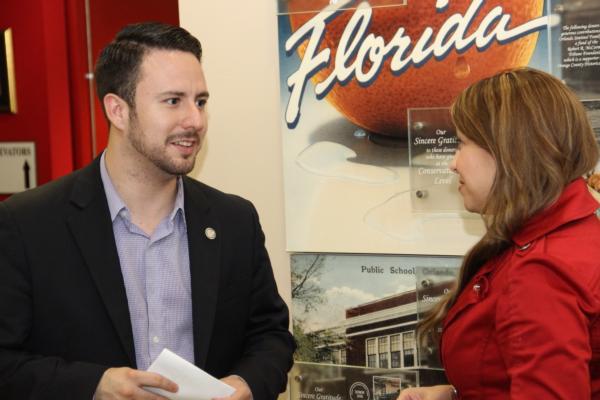
Paulo Sibaja
August 23, 2013
LI Engages Latinos in Florida
The Leadership Institute and partnering organizations went to Orlando, Florida to meet with more than 70 people from across the I-4 corridor to find the issues that unite conservatives and Hispanics.Notable guests included a representative from U.S. Senator Marco Rubio's staff, a candidate for Florida governor, several candidates for Congress, local elected officials, and community and business leaders.Attendees interacted with event speakers from partnering organizations -- The LIBRE Initiative, Faith & Freedom Coalition, Voto Honesto, and the Heritage Foundation. Members of the audience asked questions ranging from immigration policy to messaging to Hispanics, winning over youth, education reform, and more. The event was held at the Orange County Regional History Center. The courtroom, a vintage early 1900's courtroom, was the same courtroom where Ted Bundy was found guilty. In fact, the corner of the defendant's desk has his name inscribed. Bertica Cabrera Morris, the featured business women, engaged the crowd and called for action. Her family fled Cuba in search of freedom. She raised five children while working and bettering the lives of those around her. She has inspired many.Sue Tombino from Boca Raton said, “This event has been very informative, passionate, and clear. We need more of these forums.” >

Carol Wehe
August 20, 2013
The Next Great Communicator Works to Defund "ObamaCare"
“Sorry for the delay; we're trying to defund Obamacare,” Nathanael Yellis said.Nathanael stays busy. By day he's deputy political director of Heritage Action, the 501c4 sister organization of The Heritage Foundation. He's also a trainer of conservative activists and young leaders.“I joined Heritage Action a month after it launched, in July of 2010,” Nathanael said.Three years later, their focus for this fall is clear: defund the Affordable Care Act.“I'm excited about our effort to defund Obamacare,” he continued. “We're working to make this the issue when Congress returns in September.”Yellis stays busy this August at a time when many in the nation's capital vacation. But, you won't hear him complaining.“It's really exciting stuff bringing conservative activists along and seeing Members of Congress respond as they hear the message from all sides,” Nathanael said.Nathanael's enthusiasm for helping conservatives extends into his own time as well. He has a history of helping activists and young leaders interested in politics.During his time at Patrick Henry College (PHC), he worked for Teen Pact leadership schools. Teen Pact gives high school students “a conservative civics education,” he shared.While at PHC, he went into debate – not originally his idea.“I started debating in college,” he said, “because my now-wife asked me to.”That wasn't his only reason for long.“I stayed in debate because it helped me learn -- knowing I had to make my own arguments gave my research and writing real purpose,” Nathanael said. “The skill of quickly seeing and communicating the essence of an idea is the key thing I learned from debate, and I use that skill every day.”Nathanael coached debate at Patrick Henry, and won many awards, including the All-American Debater title from the National Educational Debate Association.He went on to train with Ethos debate camps, and still uses his debate skills to train leaders.His advice to aspiring communicators?“Practice,” he said.That may sound simple, but Nathanael learns from history and says practice is key.“Communicating is a skill that one builds only by doing it,” he said. “We saw this in the 2012 presidential election when President Obama flopped in the first debate because he didn't practice. There is no better way to learn, so join Toastmasters, a debate club, or anything that pushes you to practice.”Like a good leader, he follows his own advice and practices his public speaking by being a faculty member for the Leadership Institute.“One of my mentors challenged me to speak to a new group every quarter to stay sharp as a communicator,” Nathanael said. “Training with LI helps me meet that goal.”Now Leadership Institute faculty, Nathanael has attended courses at LI since 2006.“At my first LI training I talked with the most interesting speaker and a few months later began interning for his company. That connection helped launch my career.”Now Nathanael trains future leaders and activists.“Teaching for LI,” he said, “keeps me sharp on how what we're doing helps the conservative movement. I enjoy surveying our work at Heritage Action and presenting the best of what we do to LI's audiences. The Leadership Institute enables our successes and our mistakes to help other conservatives, and that's part of our mission: building the movement.”That's what the Leadership Institute does with the help of faculty like Nathanael– LI trains conservatives and builds the movement.“I describe LI as two things: a solid foundation for conservatives and a strong network,” he said. “If you want to be an activist, staffer, journalist, campaigner, etc., then you at minimum need to attend the relevant LI training. As you take the next step and become a leader in your field, the Leadership Institute is the place to give back and build the network.”You can watch Nathanael Yellis's next LI training, a free live webinar, August 28 at 3 p.m. EDT. He will talk about Smart Debate: Confronting slick leftists in public arguments.You can learn more about LI training, and watch Nathanael's upcoming LI webinar appearance.Please congratulate Nathanael Yellis on his work helping American citizens make their voices heard in government and training conservative activists. Please applaud him for receiving LI's Conservative Leader Award. To nominate a Leadership Institute graduate or faculty member for the Conservative Leader Award or Conservative Leader-In-Training Award where they will have an article written about them, please contact LI's Director of External Affairs Lauren Day, at Lauren@LeadershipInstitute.org.>
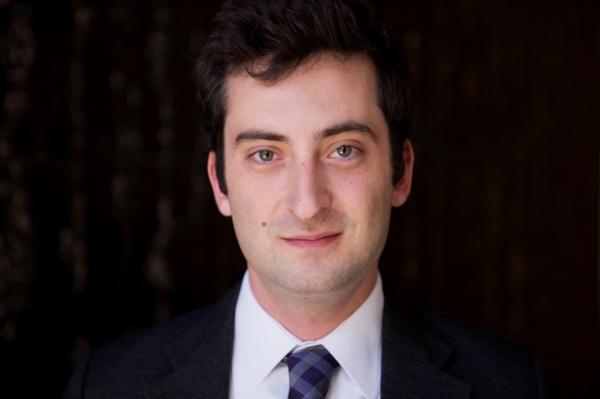
Carol Wehe
August 6, 2013
From College Socialist to Conservative Journalist
The son of a “hippie vagabond” and a New York City journalist, Lachlan Markay grew up surrounded by liberals, argued his way to conservatism in college, and has become a staple in the conservative world as a journalist and lecturer across the United States.A self-described “proud Yankee,” Lachlan grew up in New York, New Jersey, and Connecticut – states not exactly known for their conservatism.“I like to think I'm a product of the American melting pot,” said Lachlan, whose roots come from New York Jews on his dad's side and Wisconsin Catholics on his mom's side.His parents' stories still fascinate Lachlan. “My dad was a Kerouacian hippie vagabond for years,” said Lachlan. “The day after he graduated from high school, he hitchhiked from Long Island to Leadville, CO, where he worked in a mine for five or six years, before hitching back east to Maine.”Then there's his mother, a journalist who joined Newsweek at the bottom rung and “worked her way up… to a prominent spot in their NYC newsroom,” said Lachlan. Lachlan gets his adventurous side from his father, and his love of journalism from his mother.“My love and reverence for my family has really shaped who I am and continues to influence me,” said Lachlan.But, family isn't where Lachlan found his conservatism – his liberal college pushed him toward the right.“I was…a liberal,” said Lachlan. “Socialist might be more accurate.”He was surrounded by liberal thought at Hamilton College, where neither faculty nor students questioned their “knee-jerk” liberal philosophy. And that bothered Lachlan.“No thinking was required, and few of my peers could actually defend their political views,” said Lachlan. “That irked me, so I'd take every chance I could to challenge them, often taking positions with which I didn't necessarily agree.”A contrarian by nature, Lachlan challenged the status quo. “It was a combination, I think, of my affinity for arguing and my late exposure to conservative political thought that spurred the transition.”During his college years, Lachlan started studying conservative and libertarian philosophers.“Burke, Kirk, Buckley, Hayek, Nozick, Friedman, Strauss – theirs were ideas I'd never been exposed to,” said Lachlan, “and I quickly realized that I agreed with many of them.”During his political transformation as a junior in college, Lachlan followed his mother's footsteps, turning to journalism. It started with an internship and, in the end, “I wanted to write for a living,” said Lachlan, “but do so in a way that comported with and/or advanced my views.”He helped start a student newspaper, Dexter, at Hamilton College.After college, Lachlan went on to work in the D.C. area as a contributing editor for NewsBusters.org, the media watchdog site, and posted to the Washington Examiner's Opinion Zone blog. He became an investigative journalist at The Heritage Foundation in 2011. Much of his work can be found at Heritage's blog Scribe.Lachlan now works for the Washington Free Beacon on topics ranging from energy policy to campaign finance to government spending.Lachlan's advice to aspiring journalists and bloggers hits home for many activists.“It sounds harsh,” he said, “but no one cares about your opinion. If you want people to read what you write, add something new to the conversation. Do some reporting. Pick up the phone (please!) and call the people you want to write about.”When he's not investigating, on the news, or appearing on Red Alert Politics' 30 Under 30 list, Lachlan spends his time lecturing across the country for center-right organizations. He has spoken at conferences and trainings for The Heritage Foundation, FreedomWorks, Americans For Prosperity, the Franklin Center, the Intercollegiate Studies Institute, the Institute for Humane Studies, and of course the Leadership Institute, to name a few.Lachlan says “helping folks learn the tools of the trade…has been really rewarding.”Lachlan has lectured at the Leadership Institute since 2010, serving as faculty at the Writing Workshop, Blogging Workshops, and at LI's recent webinar.“When I went into my first LI training session, I assumed I'd be speaking with college students and other 20-somethings. I was pleasantly surprised to see a wide range of ages. This was during the heart of the tea party's meteoric political rise, so it was great to see people from all walks of life getting involved and really trying to learn skills that would help them advance the cause,” he said.“If you need to learn the basics,” he continued, “take an LI course. If you want more advanced training, take a Leadership Institute course. If you're just curious about how to be more effective, take an LI course. There's really no political skill that you can't learn or improve upon through LI's programs.”You can learn more about training, and watch Lachlan's most recent LI appearance in the webinar Secrets to Success at LI's website.Please congratulate Lachlan Markay on his work as an investigative journalist and training conservative activists, and please applaud him for receiving LI's Conservative Leader Award.To nominate a Leadership Institute graduate or faculty member for the Conservative Leader Award or Conservative Leader-In-Training Award where they will have an article written about them, please contact LI's Director of External Affairs Lauren Day, at Lauren@LeadershipInstitute.org.>
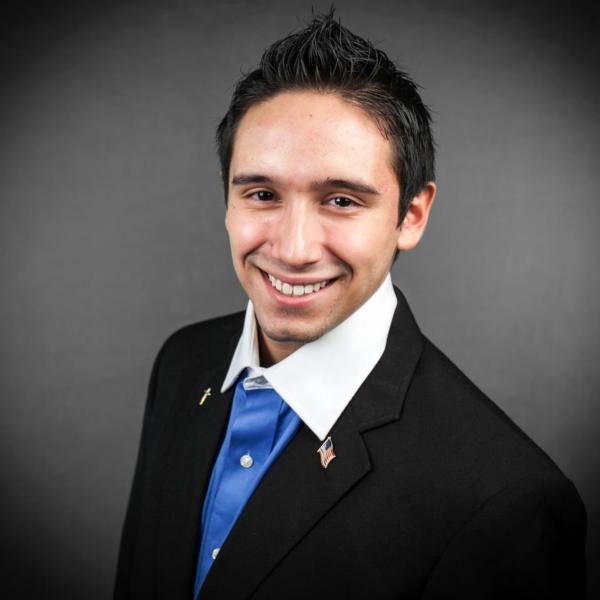
Gabriella Hoffman
July 30, 2013
College Senior Sues His University
The administration at the State University of New York (SUNY) at Buffalo, nicknamed the University at Buffalo, is not pleased with Christian Andzel.You see, he's a conservative rising senior recruiting more students to his cause, and the university has attempted to silence him and his club members. The University at Buffalo (UB) Students for Life club, of which Christian was president, hosted the Center for Bio-Ethical Reform's Genocide Awareness Project last semester. It compares the victims of abortion to the victims of the genocides of world history. The panel display attracted a lot of attention from students and faculty members, and subsequent confrontation by radical feminist professors who shouted expletives at pro-life students. One female professor was later arrested by the police for accosting a student. Campus Reform, a project of the Leadership Institute, covered the incident. Christian, a Leadership Institute graduate, had the courage to politely confront one of the professors who protested his club's display.But another professor filed charges of “disruption” against Christian. If he's found guilty of these charges, Christian faces an unnecessarily harsh punishment involving community service hours and a mark on his record.So now, he is suing his university for not protecting his right to free assembly and speech.“I am in two big lawsuits against my university because I believe in freedom and, at the University at Buffalo, there have been times when freedoms are not protected,” Christian said. “I will be the last person they bully and coerce with unconstitutional policies and actions.”The university unfairly charged Christian's group a heightened security fee when they hosted a debate, and the university went after Christian when he spoke out against a professor in the classroom.“I am the defendant in this case, University at Buffalo v. Christian Andzel, because I raised my hand in class and spoke up in a respectful manner about content the professor did not agree with. To make an example of me she filed school charges of ‘disruption,'” Christian said.Christian is cautiously optimistic about the case. Free speech, he says, must be safeguarded for all students, even conservative ones.“I want to be very clear and say I did not disrupt the class. If she thinks providing an opinion is disruption, and if the court rules against me, we will see a dangerous precedent where when professors do not like what a student says, she or he can report the student for disruption. Say goodbye to our freedom of speech,” Christian said. “We must stand strong and fight for freedom in our classrooms.”Despite these pending cases, Christian plans to continue more conservative events, speakers, and campaigns. He'll continue to use the skills he acquired through Leadership Institute trainings. His plans for the semester include holding a pro-life human rights conference, hosting several speakers, and recruiting more students to all conservative-leaning clubs on campus.Christian credits his Catholic faith and love of country as driving forces behind his activism. He is a tireless defender of faith, family, and freedom – and he's not afraid to champion these principles on campus. Like a growing number of young people today, Christian affirmed his conservative beliefs in college.“I became a conservative because in my early years of college I was sick of the left pushing their values onto me in a rather forceful way,” Christian said. “Liberalism deteriorates families and the economy. I needed answers and policies that could fix the stagnation and decline -- and the answers lie in conservatism.”He added, “I am a conservative because I know that free enterprise and free markets, traditional values, and a common-sense foreign policy is what has made and will continue to make America great and prosperous.”Christian has been involved in conservative groups for most of his collegiate career. Currently, Christian serves as the president of UB Conservatives, a group that promotes conservative values of limited government, traditional values, and strong national defense.He previously presided over the UB Students for Life club as president. Although UB repeatedly refused to recognize the pro-life club on campus, Christian worked tirelessly to make it happen – and his hard work paid off. In April 2012, the Students for Life club was officially recognized.He has worked with the Young Americans for Liberty chapter to help grow the campus conservative coalition and was selected to be a Government Relations Coordinator within student government past year.Outside of campus, Christian is involved in local Republican and conservative groups. He has volunteered for several candidates, including newly-elected Congressman Chris Collins (NY-27).As an outspoken conservative on campus, Christian often is subject to attack by his liberal peers and professors.“I face challenges, as an out and proud conservative activist, almost every day,” Christian admitted. “Some people know me on campus as that activist kid that loves to debate and think of solutions to today's problems. I will constantly, in a respectful way, challenge the ideas of the liberal status quo in my peers and professors.”You can impact your campus too!Check out LI's training schedule here.During his time in college, Christian has participated in a plethora of Leadership Institute trainings including the 2012 Student Leadership Conference, Public Speaking Workshop, and Campus Elections Workshop.“The Leadership Institute has allowed me to flourish as a committed conservative activist because the staff has not only taken an interest in my conservative clubs, but they also care about me as an individual. LI wants to ensure that as an activist you are well prepared for the battlefield,” Christian said. You too can be “prepared for the battlefield” by working with your Regional Field Coordinator this fall to challenge bias on your campus and stand up for your freedom. Contact Mike Armstrong at MArmstrong@LeadershipInstitute.org to get connected to the person who specifically works with students in your state.He added, “Without the Leadership Institute, I would not be where I am today because they have always had my back. The left on campus hates me and in several ways has gone out of their way to demonize and destroy my credibility. I will continue to fight back with Leadership Institute's help because this war of ideas – and our future – is worth it.” Christian will be graduating from the University at Buffalo next spring with Bachelor's degree in political science and history.Please congratulate Christian Andzel on his activism, and please applaud him for receiving LI's most recent Conservative Leader-In-Training award.To nominate a Leadership Institute graduate or faculty member for the Conservative Leader Award or Conservative Leader-In-Training Award where they will have an article written about them, please contact LI's Director of External Affairs Lauren Day, at Lauren@LeadershipInstitute.org.>
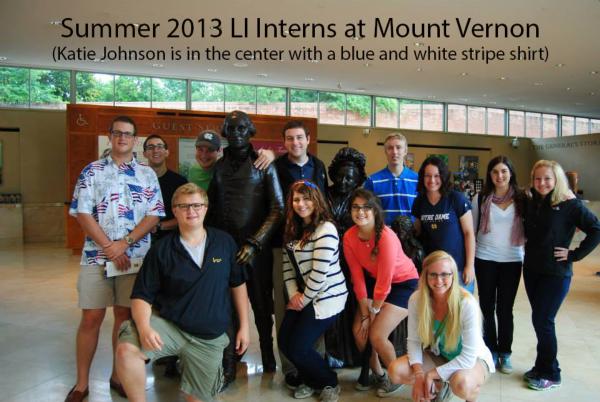
Katie Johnson
July 22, 2013
5 Things You Learn During Your First Few Weeks of a DC Internship
Intern season is here again in the DC metro area!During the summer students and young professionals from across the country and all over the world descend upon the District, a.k.a. Hollywood for political junkies, hoping to jump-start their careers.Thirteen lucky interns, me included, have the opportunity of a lifetime: interning with the Leadership Institute this summer!No matter what organization interns work for in the DC metro area, whether it be on the Hill, a non-profit, or a private company, interns are sure to learn a great deal during their time in the DC.Working at the Leadership Institute has been no exception. Below are some basic things I've learned during my first few weeks as an intern!.*Be prepared to fail, but learn your lesson and don't make the same mistake twice—Interns are new to the office. They can and will make mistakes. During one of my first weeks, my supervisor gave me directions on how to refill the coffee maker, which I completely forgot. Later a fountain of coffee came flowing out of the coffee pot and all over the kitchen counter. Always listen to your supervisors: the advice and directions they give are there for a reason.*Stay optimistic and have a can-do attitude— Sometimes you will be put in high-stress situations and will certainly be required to multitask and juggle directives from several different bosses and intern coordinators at once. Don't be afraid to lighten the situation with a joke or two (appropriate, of course). Always make the best of your situation and stay positive! Be willing to face challenges head on; don't complain, and your hard work will pay off in the end.*Social media: it's a blessing and a curse— Some jobs, including mine, require the use of social media. That's awesome! Young people today are all about Facebook, Twitter, and Instagram. However, you are still working so be sure to balance your social media usage with time delegated to other tasks. Prioritize—some tasks need to get done immediately, while others, such as a Facebook post or a tweet, can get done later, or can be scheduled ahead of time using awesome programs such as Hootsuite or Buffer.*Watch your spending – This applies to internships in any city, not just DC. When you're not working, you have a vast array of entertainment choices: events, concerts, restaurants, shopping, food trucks, museums, etc. However, city life is expensive! Know your limits when it comes to spending and also take advantage of discounts whenever possible. In DC there is always another happy hour, intern appreciation week, or free networking luncheon. Take full advantage of these free and inexpensive events and be smart with your finances.*Be Concise and Direct—Know what you want and ask for it in the shortest and most concise way possible. People are willing to help you if you ask for help, but you need to do it in a way that isn't verbose. This applies to everything from writing e-mails to co-workers to asking for an extended lunch so you can attend that policy briefing. Just remember to keep it simple. >

Leadership Institute
July 13, 2013
Summer vacation at the Leadership Institute
Tan and rested they are not. But they return home a little smarter, a lot more effective, and with many more friends in the conservative movement.For an activist like you, this may sound like a holiday.So far this summer, more than 3,700 conservatives just like you agreed -- choosing Leadership Institute training over a beach, trading swimming and relaxing for learning from experienced political professionals, and picking up pens and notepads instead of hot dogs and hamburgers.Our movement and our country will be grateful they did.As Senator Rand Paul said, "If more conservative candidates have the same secret weapon I had -- top staff and key volunteers trained by the Leadership Institute -- you and I will see many more conservative victories in the future."You can imagine how many LI staff, graduates, and donors have that line committed to memory. It cuts to the core of the Institute's mission -- and what graduates like you do every day.Just see some of the highlights from this summer.Issues That UniteSince its launch in May, LI's Issues That Unite: Latinos and Conservatism has trained 410 conservatives. At these intensive evening workshops -- held so far in Nevada, New Mexico, Colorado, and Virginia -- attendees learned how to welcome Latinos into the conservative movement, how to work best with Spanish-language media, and how to talk persuasively about the values Latinos and conservatives share.The influence of Latinos in business, politics, and American culture is growing at a dramatic rate. But their involvement in the conservative movement has not matched that pace. LI and partnering organizations are changing that...one evening at a time.You may register for upcoming Issues That Unite events in Orlando, Florida; Houston, Texas; Miami, Florida; or Los Angeles, California.Bring a conservative friend. Better yet? Bring five.Virginia: Voting Is Not EnoughIt is election season in Virginia, which means LI is training activists and campaign staff to work for the candidates of their choice. Since January, the Institute has offered custom, targeted workshops for Virginians, training 540 conservatives so far.But it's really heating up this summer, with five trainings in June, eight trainings in July, and seven trainings already scheduled in August in locations all across the state.Live in Virginia and want to get involved? Contact Christopher Doss, Deputy Director of Grassroots, who's running the show.Impressive numbers at summer trainingsConservatives are hungry to learn how to win. That's one way to explain the eye-popping numbers from trainings at the Institute this summer.In June, the Conservative Intern Workshop trained 98 interns from 30 conservative organizations in and around Washington, D.C. Interns learned how to make the most of their current internships and land full-time jobs when they graduate.In July, the Youth Leadership School, LI's flagship training, welcomed 141 young conservatives. In an intensive, two-day political bootcamp, they learned ho wto run mass-based youth efforts for the candidates of their choice. Look for them on the campaign trail.In August, just last week, the Future Candidate School hosted more than 100 conservatives who plan to run for office. In four days (45 hours of instruction), they learned how to decide when they're ready to run, how to build their networks and raise funds, and how to devise a grassroots-powered political campaign.LI grads have done great things in office. Many of these aspiring candidates will join them soon.With three more weeks of summer, Institute trainings aren't slowing down. They're just getting started.Check out LI's 2013 training calendar. If you register this week, use the promotion code LeadMemo to save 25% on your registration fee. But hurry! The code will expire this Saturday, August 17.>
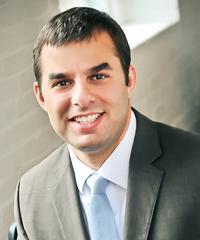
Amanda Anderson
June 4, 2013
Rep. Justin Amash (MI-3) to speak at LI tomorrow morning
Representative Justin Amash (MI-03) will speak at the Leadership Institute's Wednesday Wake-Up Club Breakfast on Wednesday, June 5 at 8:00 A.M. Rep. Amash will discuss his election to Congress in the Tea Party wave of 2010 and his experience as an advocate for limited government."Congressman Amash is part of the next generation leading the fight for limited government -- no small feat in Washington, D.C.," said Morton Blackwell, Institute president. "Conservatives are likely to enjoy his remarks."Rep. Amash serves on the Committee on Oversight and Government Reform; he was removed from the Committee on the Budget in December 2012. He is known for using his Facebook fan page to explain his votes in Congress and for personally managing his Twitter account.The Leadership Institute hosts its Wednesday Wake-Up Club Breakfast on the first Wednesday of each month. Its breakfasts are an opportunity for supporters and graduates to hear from prominent conservatives.To attend the breakfast, contact me at 703-247-2000 or register online. Registration is $10 and includes a buffet breakfast. The doors open at 7:30 A.M. and the program begins at 8:00 A.M.Update: You can watch Representative Amash's speech at LeadershipInstitute.org/speakers/>